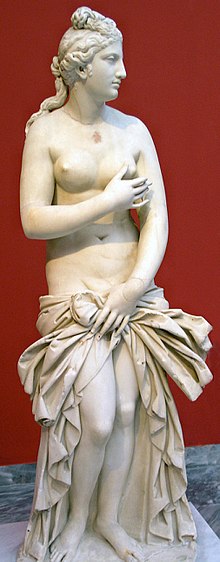Aphrodite
| Aphrodite | |
|---|---|
Goddess of love , beauty sexuality, lust, desire, prostitution, procreation, joy, happiness, pleasure and femineity | |
 Aphrodite Pudica (Roman copy of 2nd century AD), National Archaeological Museum, Athens | |
| Abode | Mount Olympus |
| Symbol | Dolphin, Rose, Scallop Shell, Myrtle, Dove, Sparrow, Girdle, Mirror, Pearl and Swan |
| Personal information | |
| Consort | Hephaestus, Ares, Poseidon, Hermes, Dionysus, Adonis, and Anchises |
| Children | With Ares: Eros,[1] Phobos, Deimos, Harmonia, Pothos, Anteros, Himeros, With Hermes: Hermaphroditus, With Poseidon: Rhodos, Eryx, With Dionysus: Peitho, The Graces, Priapus, With Anchises: Aeneas |
| Parents | In the Iliad: Zeus and Dione[2] In Theogony: Uranus's severed genitals[3] |
| Siblings | Aeacus, Angelos, Apollo, Ares, Artemis, Athena, Dionysus, Eileithyia, Enyo, Eris, Ersa, Hebe, Helen of Troy, Hephaestus, Heracles, Hermes, Minos, Pandia, Persephone, Perseus, Rhadamanthus, the Graces, the Horae, the Litae, the Muses, the Moirai, or the Titans, the Cyclopes, the Meliae, the Erinyes (Furies), the Giants, the Hekatonkheires |
| Equivalents | |
| Roman equivalent | Venus |
| Mesopotamian equivalent | Inanna/Ishtar |
| Canaanite equivalent | Astarte |
Aphrodite (Ancient Greek: Ἀφροδίτη, Aphrodítē) is the Ancient Greek goddess of love, beauty. She was also the goddess of procreation. Aphrodite is one of the Twelve Olympians. The most beautiful and refined of the goddesses, Aphrodite was married to Hephaestus, god of fire and metalworking. Aphrodite had numerous affairs with other beings, the most notable of these being Ares, the god of war.
In Homer's Iliad, one of the Oceanids. In Hesiod's Theogony, however, Aphrodite is stated to have risen from sea foam, formed at the spot where Uranos' genitals landed, after Kronos castrated him and tossed them into the sea. Aphrodite's cult was centered on the islands of Cythera and Cyprus, both of which were claimed to be her birthplace. Her main festival was the Aphrodisia, which was celebrated annually every midsummer. The Charites (minor goddesses of grace and splendor) attended to Aphrodite and served as her handmaidens. Aphrodite's symbols include the dolphin, myrtle, rose, dove, sparrow, swan and pearl, and the dove, sparrow and swan were her sacred animals. The goddess Venus is her Roman equivalent. Aphrodite was quite often described as very beautiful, and was used as a point of comparison for female beauty - but just as she was beautiful, she was just as smart and wise.
Children
[change | change source]Eros, Phobos, Deimos, Harmonia, Pothos, Anteros, Himeros, Hermaphroditos, Rhode, Eryx, Peitho, Tyche, Eunomia, The Graces, Priapus, and Aeneas. She has 16 children in total.
Marriage
[change | change source]Aphrodite was very beautiful, which made Zeus afraid that she would be the cause of fights between the other gods. He therefore gave Aphrodite to Hephaestus. Hephaestus was happy to be married to Aphrodite and gave her many pieces of jewelry which were gifts of love, like a belt that when ever she wore it, it would make men be attracted to her. Aphrodite, however, was not attracted to him. So she spent most of her time with Ares, but she also spent time with Adonis and Anchises. She had many children.
- children with Ares (pronounced air-es): Harmonia, Deimos (pronounced day-mos), Phobos, and Eros (pronounced e-ros).
- child with Anchises (pronounced an-chi-ses): Aeneas (pronounced ain-ne-us).
